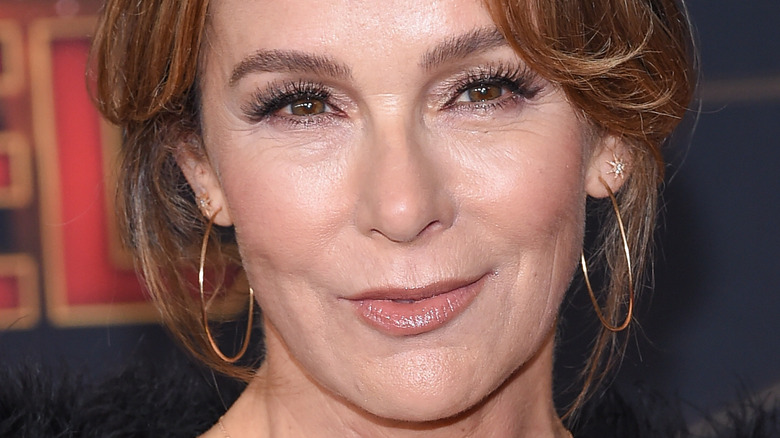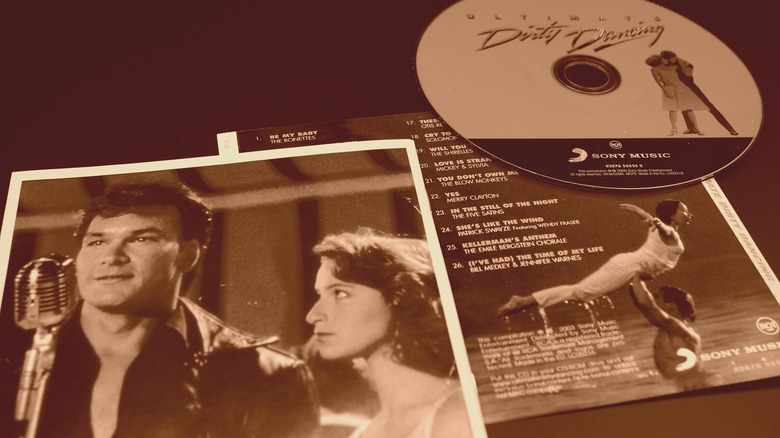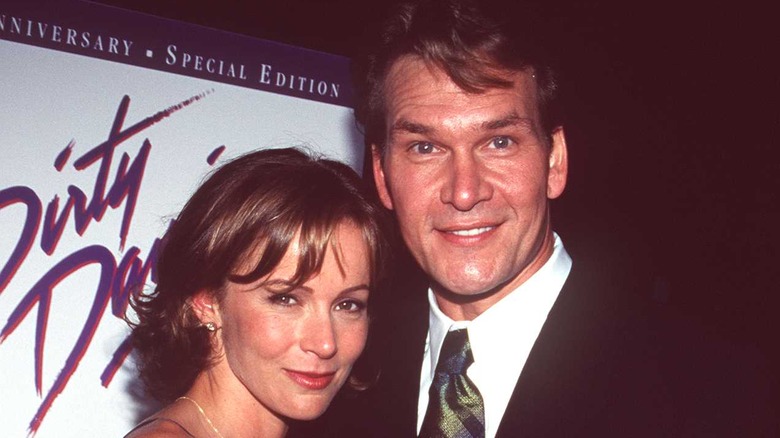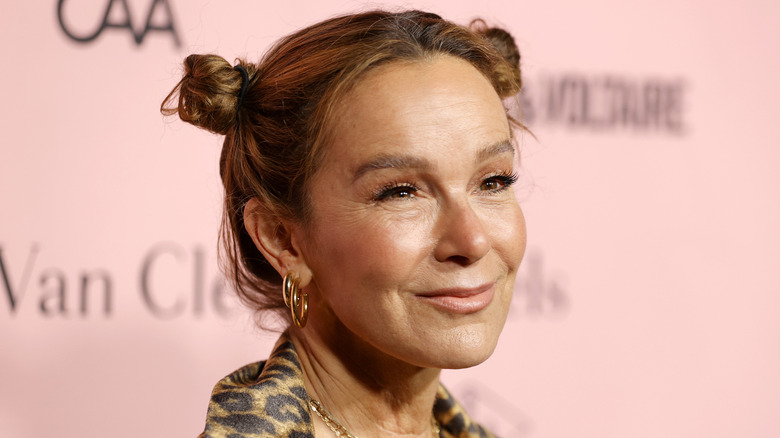Why Jennifer Grey Says Dirty Dancing Is A Feminist Movie
We may receive a commission on purchases made from links.
The following article includes references to abortion.
With legendary "Cabaret" actor-dancer Joel Grey as her father and actor-singer Jo Wilder as her mother, Jennifer Grey was born with show biz in her blood (per IMDb). She played Ferris Bueller's petulant younger sister in the John Hughes teen classic "Ferris Bueller's Day Off," and she had parts in films such as "Red Dawn" and "The Cotton Club." But the role that will be linked to Grey forever is Frances "Baby" Houseman — aka the girl from "Dirty Dancing."
On its surface, "Dirty Dancing" is a simple love story about Baby falling in love with Johnny, a dance instructor at the Catskills resort where the idealistic teen and her family spend the summer of 1963. Fans of the film quote two lines in particular: "I carried a watermelon" and "Nobody puts Baby in a corner" (a line that Patrick Swayze actually hated saying).
But the 1987 film is much more than just a love story. "There are so many layers to this movie. There is so much goodness under what feels like a fluffy rom-com fairytale. There is so much depth in the structure of the characters, and the relevance to what's going on right now," Grey told Entertainment Weekly in August 2022, two months after the Roe v. Wade reversal. "We were writing about abortion and illegal abortions."
Dirty Dancing shows the reality of a botched abortion
The character who becomes pregnant in "Dirty Dancing" is Penny, Johnny's friend and dance partner. After Penny's so-called boyfriend abandons her, Johnny's cousin lines up an illegal abortion — which goes horribly wrong. Baby must fetch her father, a doctor, to save Penny's life.
"We saw someone who was hemorrhaging," Grey told The Los Angeles Times. "We saw what happens to people without means — the haves and the have nots. I love that part of the storyline because it was really a feminist movie in a rom-com."
She explained to Entertainment Weekly that under the guise of being light and frothy, the movie very sneakily shone a spotlight on serious issues related to feminism, class, healthcare, and social justice. "Even though Penny was a white woman, she was a working-class white woman who did not have access to good healthcare," Grey said. "It's a feminist movie, but it's very stealth."
Right before "Dirty Dancing" was released, screenwriter Eleanor Bergstein was asked by producers to remove the illegal abortion from the storyline, to appease a potential sponsor who feared backlash. Bergstein described to Gender Across Borders that Penny's abortion was woven so tightly into the plot, that it couldn't be cut without the entire plot falling apart, so the abortion stayed. "Not many people talked about it, except that we got a very, very big feminist audience," she recalled.
Jennifer Grey's character is a feminist role model
In a personal essay in The Guardian, Melissa McEwan called Jennifer Grey's "Dirty Dancing" character "the plucky star of my feminist awakening." McEwan praised how Baby is intelligent, ambitious, curious, and driven by a strong sense of right and wrong. "She stands up for herself, and she confidently sticks to her ethics and accepts the consequences of her decisions. She admires other women without competing with them and ignores perfectly adequate male suitors with no qualm of being unpartnered."
Perhaps most revolutionary of all is Baby's sexual empowerment. She chooses to have sex with Johnny — and the sex is good. Baby doesn't suffer the dire (sometimes fatal) consequences that sexually active female teenagers all too often face in movies.
In a 2019 essay in The Independent, Katy Brand described the movie as "a feminist manifesto" and Baby as "an underrated feminist icon." She wrote, "Female solidarity and male support are the twin poles holding up 'Dirty Dancing' as a feminist trailblazer — a film that weaves a difficult and upsetting issue into an otherwise joyful confection in a principled, careful way." Brand penned the 2019 memoir "I Carried a Watermelon," which examines both the movie's enduring legacy — including how it's celebrated amongst abortion rights activists — and the author's own personal obsession with the film.
The relevance of the film after the reversal of Roe v. Wade
Jennifer Grey is horrified that "Dirty Dancing" is newly relevant today, after the Supreme Court overturned Roe v. Wade and made access to safe, legal abortion far more difficult — and, in many cases, impossible — for pregnant people across America.
"When we made this movie, it was never in anybody's wildest imaginations that this would ever resurface as a threat to all women, and to the doctors who would help them. These doctors, their whole job is to save people's lives and to take care of people — and then to turn it into a legal issue is madness," Grey said during her interview with Entertainment Weekly. "We have laws that penalize nature — and the laws are made by men who have never known what is to lose their career, or see their dreams of a future life cut short."
That's not to say that all hope is lost. The film's screenwriter, Eleanor Bergstein, has always believed in the power of idealistic people like Baby to make the world a better place. "What I would like to do is get young people to understand that the most exciting, most sexual, most alive thing you can do is to be very, very active in politics," Bergstein told Tablet. "I think that's the only thing that will turn the world around in the way it needs to be."



